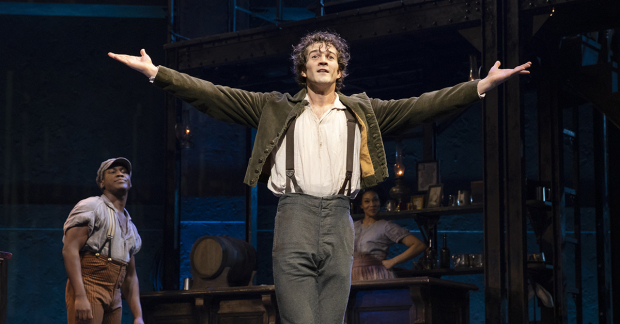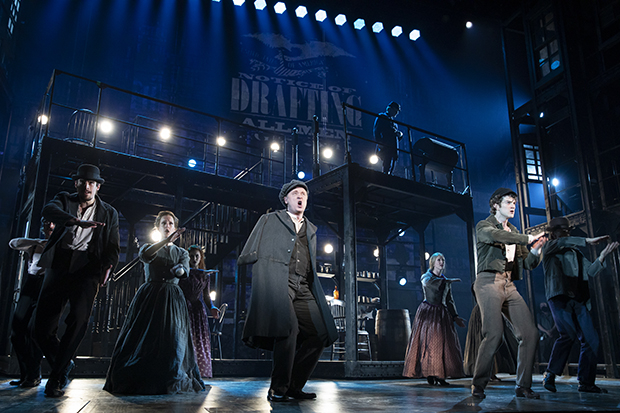Interview: A.J. Shively Digs Into the History Behind Paradise Square
Shively co-stars in the new musical at the Barrymore Theatre.
A.J. Shively has seen Paradise Square through a lot of productions. Since its January 2019 tryout run at Berkeley Rep, Shively has honed and develop the role of Owen Duignan, a newly arrived Irish immigrant who has a sneaking suspicion that he's about to get drafted to fight in the Civil War. The musical itself has undergone a lot of changes and honing over the last three years, too, but one thing has stayed the same: it's pretty incredible to watch him take center stage and perform some thrilling Irish step dancing. Here, he tells us how he learned it all, and from scratch, no less.

(© Julieta Cervantes)
This conversation has been condensed and edited for clarity.
The subject matter of Paradise Square isn't really discussed — even in basic New York City history, it rarely comes up. As an actor, where do you begin, then, in terms of research?
One of the greatest resources is a book called Five Points by Tyler Anbinder, but one of the hardest parts about putting this show together is that there's no real source material, just the fact that it happened.
I knew a bit about the Irish side of things, because this is how and when and why my family came to America. I knew about the famine and the famine ships. My family members were indentured servants when they came, which isn't touched on in the show, and they wound up in Indiana, so they weren't part of this society. So I really had no idea. But this is why I wanted to become an actor. I've always been a research nerd, and acting is nothing but research projects all the time.
Are you a dancer? Because your step dancing is mighty impressive.
I didn't grow up as a dancer. Tap dancing is the only class I ever got a C in in my life. It was early in the morning and I'm not a morning person, and I was not good at it. I had a bad attitude. But I did grow up doing martial arts, so I had the body awareness. I did not know that I was capable of this level of dancing.
So you learned all this Irish step dancing from scratch? What kind of practice and training did that require from you?
The amount of focus and technique that's required! Our Irish step choreographers are Garrett Coleman and Jason Oremus, and they were so helpful in giving me moves that looked good on my body as I started from scratch. They started me off with my feet taping, and as we were setting the choreography out in Berkeley, I saw them goofing off in the corner, figuring out their own stuff, and they did this really cool kick, where they jumped up and bent both legs around each other. And I was like, "Like this?" And they were like "That's a really advanced move" but I didn't know the difference!
The hardest part was growing the little muscles in my calves that stabilize your ankles and let you jump without putting your heels down. You have to have the looseness and tension all that the same time. In Berkeley, I was sore all the time. Thankfully, those muscles have developed enough that it doesn't hurt to just exist anymore.

(© Julieta Cervantes)
How has the show and your role developed over time?
I did a workshop before Berkeley, as well, and my audition scene was my character Owen trying to sell his body to Stephen Foster, which is not in the show anymore. Like, "I've seen the way you look at me. I know you need money." That sort of thing. And I was told there might be a moment of Irish dancing. But I never had a dance audition. That's how much it's changed. And characters have been cut, characters have been added. We put in seven new scenes and three new songs between Chicago and New York.
What is it like to do this show now, in light of the events of the last two years?
It's been wild how relevant it remains, and the rolling relevance as the news cycle changes. With the invasion of the Ukraine, thinking about the prospect of any ordinary person going off to fight and what that means is kind of insane.
And the conversation is so much more available after the social justice movement. There's a vocabulary that we were trying to figure out when we were at Berkeley Rep — there weren't really words yet or books on how we talk about these things, and the social justice movement has made it possible for these difficult conversations to happen. It's a touchy subject, it's dense material, and part of the reason the community feels so strong on stage is because we had these difficult conversations in the rehearsal room.
This has been amazing to be part of. It's been very difficult, too, but it's been amazing to see people so good at what they do and succeeding. We love each other, we love the show, we believe in what we're trying to say. It's a really important story and shows that history just keeps repeating itself.









